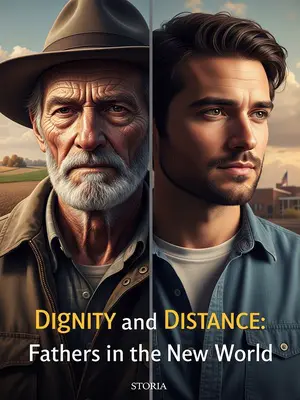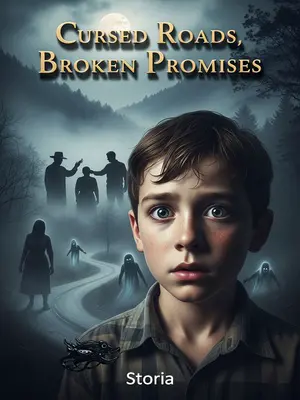Chapter 1: Shadows and Sunlight
I’m Julian Grant, the fifth son of the Grant family—old money, Maple Heights, East Coast. That kind of name gets you invited everywhere but never really welcomed. My mother was Eleanor Grant, the woman my father loved most, but she died bringing me into the world. That’s the story they tell, anyway. Sometimes I swear you can feel it in the hush at breakfast or the way the marble halls echo—like the house remembers more than it says.
So my oldest brother, Harrison, became the heir—the one Dad doted on—while I was the son he barely looked at. I grew up in that shadow. Always on the edge of the family portrait—half in the light, half out. I learned early that love wasn’t something you could count on in the Grant house. I learned that the hard way.
In a mansion where people would eat you alive if you showed weakness, if it weren’t for Harrison looking out for me, I probably would’ve disappeared—just another family ghost. But my brother couldn’t be everywhere, so I had to figure it out myself. I learned to keep my back to the wall, my eyes open, my words few. That was just survival—no other way around it.
From as early as I can remember, I was put through fencing and boxing. At first, my brothers picked on me. Eventually, though, nobody dared. I remember the taste of blood in my mouth. The satisfying crack of a glove on a jaw. The quiet pride in Harrison’s eyes when I finally stood up for myself. That’s how you survive in a place like this.
People said I was cold, ruthless. They avoided me like poison. You get used to being the family’s sharp edge, the guy people cross the street to avoid. I wore it like armor. Sometimes I wondered if there was anything underneath—maybe there was, maybe not.
Only Miles Delacroix—the heir to their estate—and his little sister were different. The Delacroixs were old Maple Heights, too. Another dynasty, but with a reputation for warmth the Grants never managed. Honestly, it was almost strange—like they didn’t get the memo about how this world works.
Miles told me yesterday his little sister had been begging to come to Maple Heights Academy. She pestered their dad until he finally caved. Today, he was bringing her to school. Honestly, he sounded like a proud big brother—half proud, half exasperated. You could hear it in his voice.
I’d heard about the Delacroix girl—she was the only daughter, the kind who always got her way. I figured she’d be just like those haughty, stuck-up girls at the Academy. The ones who wore pearls to P.E. and looked at you like you were something they might scrape off their shoe.
“So pretty.”
I’d just put away my fencing foil when I heard a soft, sweet voice. I looked up and saw the kid sister peeking out from behind Miles. She looked so small, hiding behind her brother, but her eyes? Fearless—curious, bright, like nobody had ever taught her to be scared of anyone. It caught me off guard.
She poked her head out, those big bright eyes locked on me. There was something about the way she looked—open, unguarded. Most people in our world learn to hide that kind of innocence. Makes you want to protect it, even if you know better.
I looked at the flower in my hand—a peach blossom. I was about to toss it, but maybe the little one liked it. So I handed it to her. Her fingers brushed mine, and I remember thinking how tiny her hand was. It trembled just a little. I felt it, sharp as a pinprick.
It was just a flower, but she jumped up, over the moon: “Thank you, Julian!” Her voice rang out, clear and bright, echoing in the gym. For a second, the world felt softer. I almost believed there was room for joy here. Who knew?
Turns out, this Delacroix girl really was different. I felt the first crack in my armor—a hairline fracture, but enough to let in a little warmth. I didn’t know what to do with that feeling.
A few years later, the kid who barely reached my knee was up to my chest. But her mind? Still not sharp—sometimes I wondered what she was actually learning at Maple Heights Academy. She was taller, sure, but still hopelessly naive in some ways—untouched by the cynicism that comes easy in families like ours. It made me worry for her, even as I envied it.
Other girls never dared talk to me, but she chattered in my ear every day, one person as noisy as a flock of blue jays. She’d rattle on about the smallest things, her laughter bubbling over, never noticing when I was trying to look intimidating. Sometimes, honestly, I found myself listening just to hear her voice break up the silence. I’d never admit it out loud.
One day, after I finished horseback riding and archery practice with Miles, I realized the little one was missing. The stables smelled of hay and leather, the air sharp with autumn. It was the kind of afternoon that made you want to run wild. But she was nowhere to be found.
“Where’s your sister?” I handed my bow and arrows to Ben Carter, my right-hand man, and asked Miles. Ben, as usual, just took the gear, eyes scanning the grounds like he was checking for threats. Always the same.
Miles shook his head, a little helpless: “She thinks riding and archery are too hard, so she went off to slack. I’ll go look for her.” His voice was fond, a little exasperated. Years of chasing after a kid sister who never listened.
I nodded, didn’t ask. But somehow, my feet followed Miles. Sometimes your body knows before your mind does. I found myself drifting in his wake, the two of us walking in comfortable silence, boots crunching on gravel. My mind was already racing ahead.
Miles was surprised to see me following: “You not heading back?” He shot me a look—eyebrow raised, smirk just barely there. He knew me too well.
I stiffened for a moment. I’d meant to go back—after all, we had plenty of classes today. Still, I said, “Mm, the peach trees are blooming, I want to take a walk.” I tried to sound casual, but I knew he saw right through me.
Miles nodded and started talking about what Dr. Whitman said in class. He could talk about history for hours. My mind wandered, though—half-listening, half-searching the grove ahead. I thought, maybe everyone at the Delacroix estate is a little slow on the uptake. Still, their warmth? It made up for it.
As soon as we entered the peach grove, Miles and I saw the little one under a tree. She was wearing a light blue dress, and she must’ve heard us talking, because she turned around. Sunlight caught in her hair, and for a second, the world just stopped. Everything else fell away.
A smile instantly bloomed on her face, a few peach blossoms falling by her side, making the flowers seem dull in comparison. She looked like something out of a painting—one you’d see in a dusty old gallery and never forget.
She called out sweetly, “Julian!” Her voice was like the first day of spring after a long winter. For a moment, I just stood there. If such a bright little sun belonged to me, maybe life wouldn’t feel so bitter anymore. The thought hit me hard—left a strange ache in my chest.
That day, Miles and I were kept after class by Dr. Whitman, who always made us stay to puzzle out his riddles. The old man loved his games, always pushing us to think one step further. I swear he got a kick out of it.
I knew she’d be waiting at the Grant mansion, like always. But suddenly I remembered the unfinished painting I’d left on my desk and got restless. The idea of her wandering into my studio, seeing that half-finished canvas, made my heart pound like a drum.
On the way home, I practically dragged Miles along; he said he’d never seen me so anxious. He teased me the whole way. I barely heard him—my mind was already racing.
I just lied, saying I had urgent business. I was never good at lying to Miles, but he let it slide. Maybe he understood more than he let on.
“Miss Delacroix said she wasn’t feeling well and went back first,” the housekeeper told me. She spoke carefully, eyes flicking from me to the floor. Even the staff knew how to read the Grant family’s moods.
I knew Miles was there too, but I couldn’t help but ask, “Where does she feel unwell? Why not call Dr. Morgan?” My voice came out sharper than I meant.
The housekeeper looked nervous, but Miles smiled and said, “It must not be serious, or she’d have made sure the whole house knew. You know Emmy’s temperament.” He shrugged, the corners of his mouth quirking up. I couldn’t help but smile, just a little. He wasn’t wrong.
I knew that. The little one couldn’t stand any slight. She wore her heart on her sleeve, never hiding when she was hurt or upset. It made her easy to read—and easy to love. Sometimes I wondered if she’d ever realize it.













